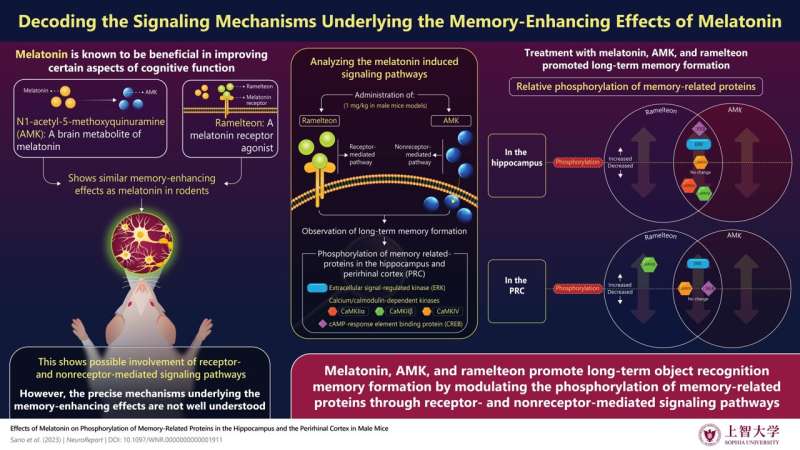This article has been reviewed according to Science X's editorial process and policies. Editors have highlighted the following attributes while ensuring the content's credibility:
fact-checked
proofread
Melatonin and its derivatives found to enhance long-term object recognition memory

Multiple studies have demonstrated the memory-enhancing effects of melatonin and its derivatives in animal models. It is also known that the formation of both short- and long-term memories require the phosphorylation of certain memory-related proteins.
However, the molecular mechanisms underlying melatonin-induced memory enhancement have remained elusive. Now, medical researchers from Sophia University, Japan, have made important findings that contribute significantly to the elucidation of the underlying mechanisms in a recent article that was published NeuroReport on June 7, 2023.
Regarding the premise of the study, lead author Professor Atsuhiko Chiba from the Department of Materials and Life Sciences, Faculty of Science and Technology, Sophia University, says, "Our study aimed to investigate the effects of melatonin, ramelteon, and N1-acetyl-5-methoxyquinuramine on the relative phosphorylation levels of memory-related proteins in order to explore candidate signaling pathways associated with the receptor- and nonreceptor-mediated memory-enhancing effects of melatonin."
The research team, which included Dr. Masahiro Sano (currently affiliated with Tohoku University) and Dr. Hikaru Iwashita (currently affiliated with Kansai Medical University), examined the effects of three compounds on memory formation; these compounds were melatonin, a hormone secreted by the pineal gland located in the brain; N1-acetyl-5-methoxyquinuramine (AMK), melatonin's biological metabolite; and ramelteon, a drug that binds and activates the melatonin receptor.
In addition, they examined "phosphorylation," or the biochemical addition of phosphate groups to protein structures, in five key proteins involved in memory formation. These included the protein extracellular signal-regulated kinase (ERK), calcium/calmodulin-dependent kinase IIα (CaMKIIα), CaMKIIβ, CaMKIV, and the cAMP-response element binding protein (CREB).
Initial experiments conducted on male mice clearly showed that the administration of melatonin, ramelteon, or AMK at a dose of 1 mg/kg facilitated the formation of long-term memory. The researchers did not investigate the effects of the three compounds on female mice to avoid any likely data variability resulting from the reproductive cycles occurring in female mammals.
Long-term memory formation in male mice was assessed by conducting a series of experiments based on the novel objection recognition task or "NORT." In this study, laboratory mice under investigation were first acclimated to an experimental arena for five minutes per day for three consecutive days. On the fourth day, two identical objects were placed in the experimental arena and mice were allowed to explore these objects for five minutes (training phase).
Twenty-four hours after the cessation of the training phase, the male mice were subjected to testing. During the testing phase, one out of the two familiar objects was replaced with a new or unfamiliar object. The amount of time spent by the mice exploring each object—a good measure of object recognition memory—was recorded by a trained observer. It is a known fact that mice spend more time exploring novel objects they encounter and less near familiar objects.
The researchers then studied the effects of ramelteon and AMK on the phosphorylation of ERK, CaMKIIα, CaMKIIβ, CaMKIV, and CREB in the male mouse brain after sacrificing the rodents using standard protocols. In the hippocampus, which is the learning and memory center of the mammalian brain, treatment with ramelteon/AMK significantly increased the phosphorylation of both ERK and CREB.
However, these drugs significantly decreased CaMKIIα/β phosphorylation in the same brain region. In the perirhinal cortex (PRC), which is also associated with memory functions, both ramelteon and AMK significantly increased ERK, and only ramelteon significantly increased CaMKIIβ phosphorylation. In the hippocampus/PRC, ramelteon/AMK did not affect the phosphorylation of CaMKIV.
Prof. Chiba concludes, "Our findings suggest that melatonin is involved in promoting the formation of long-term object recognition memory by modulating the phosphorylation levels of memory-related proteins such as ERK, CaMKIIs, and CREB in both receptor-mediated and nonreceptor-mediated signaling pathways."
The researchers believe that the results of their study will contribute to the development of new drugs that can improve memory function in people suffering from age-related memory impairment with fewer side effects.
More information: Masahiro Sano et al, Effects of melatonin on phosphorylation of memory-related proteins in the hippocampus and the perirhinal cortex in male mice, NeuroReport (2023). DOI: 10.1097/WNR.0000000000001911



















